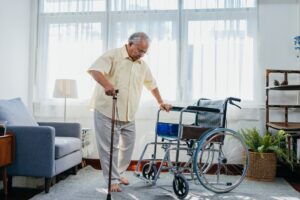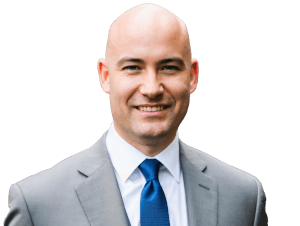
Most falls in nursing homes happen due to physical challenges, environmental hazards, and staffing issues. Many residents experience muscle weakness or balance problems, which increases the risk of falling. Medications can cause side effects such as dizziness or confusion.
Residents with dementia or other cognitive impairments may misjudge their abilities or forget they need help. In facilities with inadequate staffing or poor training protocols, response times may be slow, and residents identified as fall risks might attempt to move independently.
If your loved one experienced a fall and injury in a nursing home, it is important to ask questions and advocate for them. Our Atlanta nursing home abuse lawyers have recovered millions for nursing home residents and their families. Call today for a free consultation.
Common Causes of Falls in Nursing Homes
The causes of most falls in nursing homes are avoidable with the right precautions in place. While it may not be possible to eliminate every fall, nursing facilities have a clear responsibility to minimize risk whenever possible. Some of the most common causes of falls include:
Muscle Weakness and Balance Issues
As we age, we often lose muscle strength and coordination. For nursing home residents, this can make even simple movements like standing or walking difficult. Weak leg muscles and poor posture reduce stability, causing issues with everyday mobility.
Medications
Many nursing home residents take multiple medications that affect alertness, blood pressure, or motor function. Drugs like sedatives, antidepressants, and antihypertensives can induce dizziness, confusion, or delayed reaction times.
Environmental Hazards
Falls frequently occur in poorly maintained or unsafe environments. Slippery floors, uneven thresholds, inadequate lighting, and missing handrails present dangers for residents.
Cognitive Impairment
Residents with dementia or other cognitive disorders often misjudge their physical ability or forget they need assistance. They may attempt to walk alone, ignore safety instructions, or wander into unsafe areas.
Inadequate Staffing
Understaffing or poorly trained caregivers can leave residents without help when they need it. When staff miss call bells, delay responses, or fail to assist with transfers, residents often try to move unassisted. Without the right support, the chance of a fall rises sharply.
Are Falls in Nursing Homes Common?
Falls in nursing homes are unfortunately very common, and many residents fall more than once.
Falls are a major concern for our older population, whether or not they live in a nursing facility. According to CDC older adult falls data, one in four people age 65 or older will experience a fall every year.
How Can Nursing Homes Prevent Falls?
Effective fall prevention requires coordination among medical staff, caregivers, and facility administrators. Staff training plays a key role in identifying at-risk residents and recognizing warning signs before accidents occur.
The causes of most falls in nursing homes may be mitigated by:
- Conducting thorough fall risk assessments for each resident and updating care plans regularly
- Ensuring staff assistance for residents with mobility issues, monitoring medication effects, and maintaining clean, hazard-free environments
- Installing handrails, non-slip flooring, and proper lighting in all resident areas
- Responding quickly to call bells
- Assisting with transfers where necessary
- Providing physical therapy and strength-building exercises to improve balance and stability

Who Regulates Nursing Home Falls Prevention?
Federal and state agencies regulate nursing home safety, including fall prevention. The Centers for Medicare & Medicaid Services sets national standards and evaluates facilities through regular inspections.
Facilities must follow guidelines under the Nursing Home Reform Act, which requires them to maintain each resident’s highest practicable level of well-being.
State health departments, such as the Long-Term Care Division of the Georgia Department of Community Health, conduct surveys and investigate complaints.

How Can I Investigate Nursing Home Falls?
To investigate a fall in a nursing home, begin by requesting the resident’s care plan, incident reports, and medical records. If you’re authorized to access your loved one’s medical information, the facility is usually required to provide it upon request.
Speak directly with nursing supervisors, caregivers, and other staff members to gather firsthand accounts. Pay attention to patterns such as repeated injuries, delays in care, or signs of inadequate supervision, which may suggest neglect.
If the facility resists sharing information you’re entitled to, consult a nursing home abuse attorney. You can also contact your area’s long-term care ombudsman or file a complaint with the state agency that regulates nursing homes.
Can You Sue for a Nursing Home Fall?
Yes, you can sue a nursing home for a fall if you can prove that negligence or abuse caused the injury. To have a case, you must show that the facility failed to uphold its legal duty to provide safe conditions or appropriate care.
This includes ignoring known fall risks, failing to assist with mobility, or not maintaining a safe environment. Medical records, staff statements, and expert testimony can support these claims.
If a fall results in serious injury or death, families may pursue compensation for medical costs, pain, suffering, or wrongful death. Legal action often encourages accountability and systemic change.
Get Help if Your Loved One Experienced a Fall
Although falls are common in nursing homes, that doesn’t mean they are acceptable. While it’s true that falls can happen no matter how well a nursing home staff performs, too often residents are injured when a nursing facility fails to provide an acceptable level of care.
If your loved one was hurt in a nursing home fall, don’t dismiss it. Call our team at Schenk Nursing Home Abuse Law for a free consultation and discuss your options.




